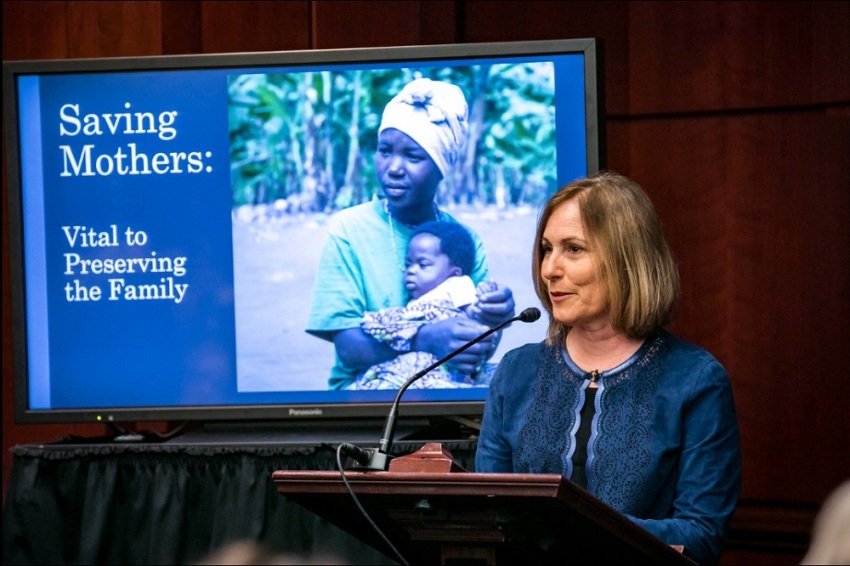HHS advisor blasts WHO for promoting medical abortions in countries with restrictions

WASHINGTON — An advisor with the Department of Health and Human Services criticized the World Health Organization for what she says is the United Nations agency’s promotion of self-managed medical abortions in countries where abortion rights are restricted.
Valerie Huber, the senior policy advisor in the HHS Office of Global Affairs, spoke last week at the Second International Conference on Family Policy. The event was hosted by the Hungarian Embassy and attended by many social conservative activists and government officials from nations like Poland, Brazil and the U.S.
Huber spoke for about 12 minutes on Wednesday morning on the topic of maternal mortality, citing statistics that show that almost 800 women die each day from preventable causes related to pregnancy and childbirth.
She said that while only one out of 5,000 women in high-income countries die from maternal mortality, that number skyrockets to 1 out of every 36 in Sub-Saharan Africa.
Huber contended that maternal mortality internationally is a “winnable battle” and is a problem that “can be cured.” She noted that in countries where rates of maternal mortality are highest the rate of skilled birth attendants is very low.
While several causes are at play when it comes to the prevalence of maternal mortality like severe bleeding after birth, infection, and preclampsia, Huber criticized the WHO for listing “unsafe abortion” as a cause of maternal mortality.
Huber, who worked for years as one of the most prominent sexual risk avoidance (abstinence) education activists in Washington, said WHO’s listing of abortion “diverts” attention from the issue of maternal mortality to a more politically charged issue of abortion.
“And ladies and gentlemen, I'm very sorry to say that in international settings, the discussion about maternal mortality is almost completely overshadowed by this debate over abortion,” she said. “And it should not be so. ... It diverts away to something that is instead controversial.”
The WHO finds that between 4.7 percent and 13.2 percent of maternal deaths can be attributed to unsafe abortions.
In the international space, Huber said, much of the conversation about safe abortion falls into two categories: “is it legal and if it's not legal, is there self-care for women in those countries to be able to have access to methods to provide abortion for themselves at home?”
“I'll give you just one example: the World Health Organization just this year promoted self-care abortion: ‘self-care for sexual and reproductive health and rights, including, for instance, self-managed medical abortion in countries where abortion is illegal or restricted,’” Huber said.
“So the World Health Organization is actually encouraging organizations to go behind the backs of countries that have any restrictions on abortion and provide self-care to the women in those countries. That even on its face from a sovereignty aspect is problematic.”
Huber stressed that there are serious complications that can arise when a mother undergoes a self-managed medical abortion, which involves taking the pill form of mifepristone and misoprostol.
Such complications include severe bleeding, blood clots in the uterus, infection and even allergic reactions.
“When you're at home and maybe miles and miles and miles from a healthcare facility that could mean life and death,” Huber said. “That is not safe.”
“In our estimation, there are several things that need to take place,” she added. “When we're talking about general international policies and health care, we need to defend the sovereignty of countries to make their own laws regarding these very sensitive issues.”
The Christian Post reached out to WHO for comment on Huber’s remarks.
A WHO spokesperson pointed CP to a guideline document on self-care interventions published by WHO earlier this year.
"Self-care for [sexual reproductive health and rights] has perhaps the greatest potential to address unmet needs or demands in marginalized populations or in contexts of limited access to health care, including, for instance, self-managed medical abortion in countries where abortion is illegal or restricted," the guideline reads.
The spokesperson also pointed CP to a 2017 WHO news release contending that "restrictive laws" are "associated with high rates of unsafe abortions."
"In countries where abortion is completely banned or permitted only to save the woman’s life or preserve her physical health, only 1 in 4 abortions were safe," the WHO news release reads. "[W]hereas, in countries where abortion is legal on broader grounds, nearly 9 in 10 abortions were done safely. Restricting access to abortions does not reduce the number of abortions."
Follow Samuel Smith on Twitter: @IamSamSmith
or Facebook: SamuelSmithCP



























